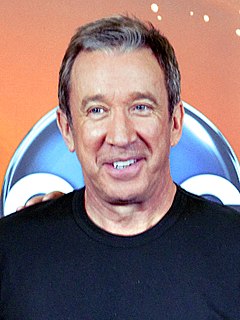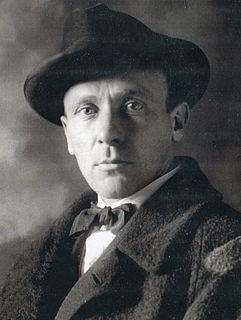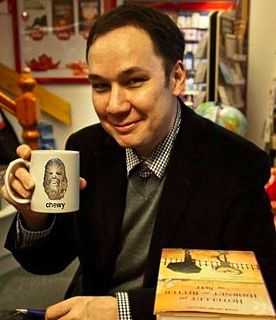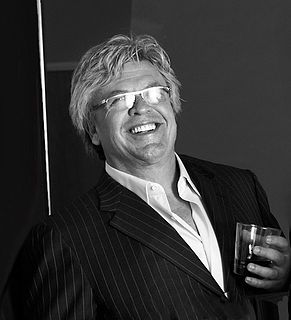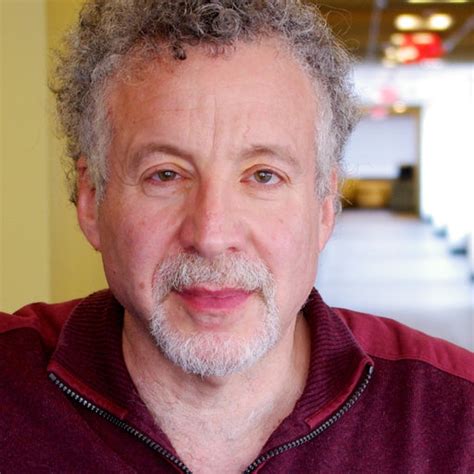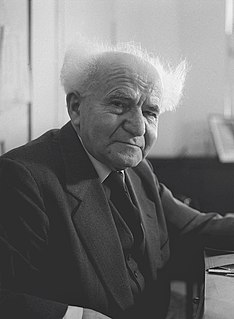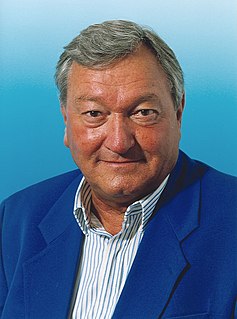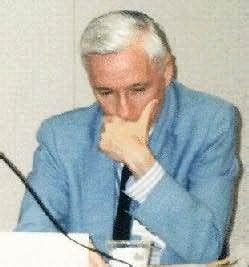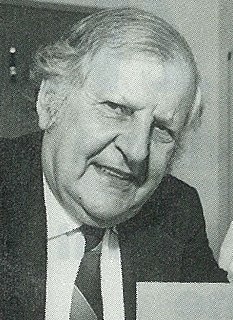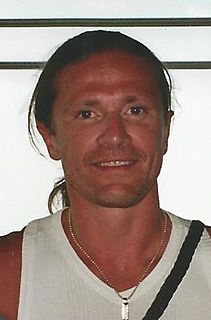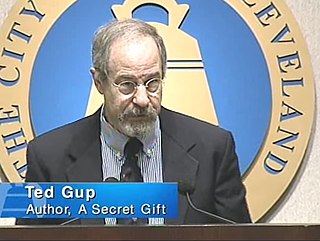Top 1200 Rhetorical Question Quotes & Sayings - Page 15
Explore popular Rhetorical Question quotes.
Last updated on December 23, 2024.
[John] Dalton was a man of regular habits. For fifty-seven years he walked out of Manchester every day; he measured the rainfall, the temperature-a singularly monotonous enterprise in this climate. Of all that mass of data, nothing whatever came. But of the one searching, almost childlike question about the weights that enter the construction of these simple molecules-out of that came modern atomic theory. That is the essence of science: ask an impertinent question, and you are on the way to the pertinent answer.
A disciple came to the celebrated Master of the Good Name with a question. “Rabbi, how are we to distinguish between a true master and a fake?” And the master of the good name said, “When you meet a person who poses as a master, ask him a question: whether he knows how to purify your thoughts. If he says that he knows, then he is a fake.
In claiming that prohibition, not the drugs themselves, is the problem, Nadelmann and many others - even policemen - have said that "the war on drugs is lost." But to demand a yes or no answer to the question "Is the war against drugs being won?" is like demanding a yes or no answer to the question "Have you stopped beating your wife yet?" Never can an unimaginative and fundamentally stupid metaphor have exerted a more baleful effect upon proper thought.
Good description is a learned skill, one of the prime reasons why you cannot succeed unless you read a lot and write a lot. It’s not just a question of how-to, you see; it’s also a question of how much to. Reading will help you answer how much, and only reams of writing will help you with the how. You can learn only by doing.
You can't be what you can't see, so it's harder for women to say, "I'm going to be a [presidential] candidate," so we need to go to women who would be good candidates and say, "You would be a good candidate and I'll help you." It's not a passive question, it's not when will it happen, but an active question, when will we make it happen?
Lord Nicholas St. John was their only hope, and she had been on the roof when he arrived, for heaven's sake. Ladies did not go traipsing about on rooftops. And certainly gentlemen did not frequent the homes of those ladies who did traipse about on roortops. It did not matter if the rooftop in question was in dire need of repair. Or that the lady in question had no choice.
Were we to still be circumcising the hood of the female clitoris, we would not have difficulty considering this a continuation of our tradition to keep girls sexually repressed. America's reflexive continuation of [male] circumcision-without-research reflects the continuation of our tradition to desensitize boys to feelings of pain, to prepare them to question the disposability of their bodies no more than they would question the disposability of their foreskins.
Can a woodchuck chuck wood? Because the question is, "how much wood could a woodchuck chuck if," so you haven't established or proved without any shadow of a doubt that a woodchuck could chuck wood. Frankly, I believe that they chew wood. I don't think they can chuck wood at all! I take offense to the whole chucking question.
I also believe that when people are going through difficult situations in life... it causes them to search a lot more. They search life and search their soul. When you’re searching, you’re suddenly a lot more open to the world around you, to the possibilities, to things you never thought about before. — When you’re happy, you don’t question the world so much. When you’re lost, you question everything. The very reason why it is so essential to human self-discovery
People want their reason for living to be a singular thing, like a career or a relationship, because this makes an individual feel secure in the physical world. We don't fare well in the realm of the invisible - so telling someone that their purpose is multilayered and includes the arduous journey of discovering who they really are is not always the answer they want to hear. But consider the complexity of the question: "What is my reason for living?" How can that question not include a journey into the depths of your own life?
The tongue can conceal the truth, but the eyes never! You're asked an unexpected question, you don't even flinch, it takes just a second to get yourself under control, you know just what you have to say to hide the truth, and you speak very convincingly, and nothing in your face twitches to give you away. But the truth, alas, has been disturbed by the question, and it rises up from the depths of your soul to flicker in your eyes and all is lost.
We're affable guys in They Might Be Giants. We're not gonna do the periscope-down thing, but it's a little bit mind-bending. The biggest struggle is trying to figure out a way to back up far enough in your answer that it can be read without the context of the question. Every declarative statement you see that comes out of an interview with somebody is actually in response to a question. So it's sort of like this very real interpersonal dance where one of the people involved is invisible.
[Malcolm Fraser] went straight from Melbourne Grammar to Oxford. And he would have been a very lonely person, and I think he probably met a lot of black students there who were also probably lonely. I think he formed friendships with them, which established his judgement about the question of colour. That’s my theory. I don’t know whether it’s right or not, but that’s what I always respected about Malcolm. He was absolutely, totally impeccable on the question of race and colour.
[from the television show,"Evade the Question Time"]At the end of the first round, I will award three points to Mr. Kaine for an excellent nonspecific condemnation, plus one bonus point for blaming the previous government and another for successfully mutating the question to promote the party line. Mr. van de Poste gets a point for a firm rebuttal, but only two points for his condemnation, as he tried to inject an impartial and intelligent observation.
The question's whether or not there's an American interest in the Civil War [in Syria]. The question is whether or not a military strike on [Bashar] Assad will cause him to be encouraged to use more weapons or discouraged. It's easy enough to say - and the president [Barack Obama] says though this will teach him a lesson - but his military strike is intended not to target him individually, not to bring about regime change.
The question is not whether we wish to see everybody as well off as possible. Among men of good will such an aim can be taken for granted. The real question concerns the proper means of achieving it. And in trying to answer this we must never lose sight of a few elementary truisms. We cannot distribute more wealth than is created. We cannot in the long run pay labor as a whole more than it produces.
People ask me all the time how I got hired onto the Office. Another common question is how do I manage to stay so down-to-earth in the face of such incredible success? ... A third frequently asked question is: "Girl, where you from? Trinidad? Guyana? Dominican Republic? You married? You got kids?" This is mostly asked by guys on the sidewalk selling I LOVE NEW YORK paraphernalia in New York City.
We've long known that firms can pay higher wages if they spend less on workplace safety enhancement. Libertarians ask, "If a worker is willing to accept higher wages in return for his agreement to exercise greater caution while performing his job, why should the government prevent him from making that choice?" It's a rhetorically powerful question, yet it overlooks the fact that the agreement in question will have adverse effects on others.
Lesson number one in trying to develop the ability of independent thought: Understand that EVERYTHING the government says has the potential to be lies and deception. You can believe it's the truth only after you question, exhaust every avenue, and find that their story checks out. If you're a patriot, it's your duty to always question your government anyway, at every turn. A patriot is loyal to his country and his countrymen, not his government.
A young nurse, someone new whom he didn't recognise, came up to Henry and patted him on the arm. "Are you a friend or a family member?" She whispered the question in his ear, trying not to disturb Sheldon. The question hung there like a beautiful chord, ringing in the air. Henry was Chinese, Sheldon obviously wasn't. They looked nothing alike. Nothing at all. "I'm distant family," Henry said.
If you thought you were trying to find out more about it because you're gonna get an answer to some deep philosophical question...you may be wrong! It may be that you can't get an answer to that particular question by finding out more about the character of nature. But my interest in science is to simply find out about the world.
I'd like to start off this show by asking you all a question, cause I don't know the answer. Uh, I lost my sunglasses and yesterday I went to the Sunglass Hut. Here's the question: Why does a pair of sunglasses cost more than a 25-inch color television set? I go to the Sunglass Hut. I see a pair that I like. I don't love them. I don't. I like 'em. $309.
It is impossible to devise an experiment without a preconceived idea; devising an experiment, we said, is putting a question; we never conceive a question without an idea which invites an answer. I consider it, therefore, an absolute principle that experiments must always be devised in view of a preconceived idea, no matter if the idea be not very clear nor very well defined.
The issue is not whether there are horrible cases where the penalty seems "right". The real question is whether we will ever design a capital system that reaches only the "right" cases, without dragging in the wrong cases, cases of innocence or cases where death is not proportionate punishment. Slowly, even reluctantly, I have realized the answer to that question is no- we will never get it right.
Today I believe that man cannot escape his destiny to create whatever it is we make - jazz, a wooden spoon, or graffiti on the wall. All of these are expressions of man's creativity, proof that man has not yet been destroyed by technology. But are we making things for the people of our epoch or repeating what has been done before? And finally, is the question itself important? We must ask ourselves that. The most important thing is always to doubt the importance of the question.
The various languages placed side by side show that with words it is never a question of truth, never a question of adequate expression; otherwise, there would not be so many languages. The 'thing in itself' (which is precisely what the pure truth, apart from any of its consequences, would be) is likewise something quite incomprehensible to the creator of language and something not in the least worth striving for.
This crazy little party girl who loves to enjoy life actually has a purpose. So, that's really the core of why I've survived so many years and I can go and I can fall down and I can get back up. Why? Because I know why I'm here. That's the question that a lot of people need to answer when they do fall is, 'Why am I here?' If you can answer that question, you'll be able to dust yourself off and shine like a phoenix out of ashes.
The question of surrender is political, it is not a question of love. And relationship is not love at all; it means love has ended and relationship has begun. It begins very soon after the honeymoon - mostly in the middle of the honeymoon. It is not easy to live with another person whose life-style is different, whose likings are different, whose education and culture is different, and above all the other happens to be a woman - even their biology is different.
With the law books filled with a great assortment of crimes, a prosecutor stands a fair chance of finding at least a technical violation of some act on the part of almost anyone. In such a case, it is not a question of discovering the commission of a crime and then looking for the man who has committed it, it is a question of picking the man and then searching the law books, or putting investigators to work, to pin some offense on him.
Everybody sees a difficulty in the question of relations between Arabs and Jews. But not everybody sees that there is no solution to this question. No solution! There is a gulf, and nothing can bridge it... We, as a nation, want this country to be ours; the Arabs, as a nation, want this country to be theirs.
I don't expect that the scientific community now embraces and kisses me 'Oh wonderful, great you did!' we have to live with critics, this is normal. Chariots of the Gods was full of speculation, I had 238 question marks. Nobody read the question mark. They always said: Mr. Von Daniken is saying... I did not say, I asked the questions, would that be a posibility? In Chariots of the Gods, I made clear difference between a speculations and facts.
Reading a book should be a conversation between you and the author. Presumably he knows more about the subject than you do; if not, you probably should not be bothering with his book. But understanding is a two-way operation; the learner has to question himself and question the teacher, once he understands what the teacher is saying. Marking a book is literally an expression of your differences or your agreements with the author. It is the highest respect you can pay him.
The first question that I ask : do I have public support or not. That is the first question that I asked as President. If I don't have the public support, whether there's the so-called "Arab spring" - it's not spring, anyway - but whether we have this or we don't, if you don't have public support, you have to quit, you have to leave. If you have public support, in any circumstances you have to stay. That's your mission, you have to help the people, you have to serve the people.
I was the type of person who was the question-asker. And not just genuine questions, I would ask a question so the author would know how much I knew about them. Once I went to a Tobias Wolff reading. I knew he was teaching at Syracuse at that time. And so, I remember asking him how he liked Syracuse. People do that to me now and it's okay. There is rarely a time when I just have had enough.
No aphorism is more frequently repeated in connection with field trials, than that we must ask Nature few questions, or, ideally, one question, at a time. The writer is convinced that this view is wholly mistaken. Nature, he suggests, will best respond to a logical and carefully thought out questionnaire; indeed, if we ask her a single question, she will often refuse to answer until some other topic has been discussed.
The most important part of the practice is for the question to remain alive and for your whole body and mind to become a question. In Zen they say that you have to ask with the pores of your skin and the marrow of your bones. A Zen saying points out: Great questioning, great awakening; little questioning, little awakening; no questioning, no awakening.
In many ways, we've been taught to think that the real question is, do people deserve to die for the crimes they've committed? And that's a very sensible question. But there's another way of thinking about where we are in our identity. The other way of thinking about it is not, do people deserve to die for the crimes they commit, but do we deserve to kill?
When you're on the bus or subway or in your car, why busy your mind with all the garbage of advertisements? Why fill your mind with television and radio? Somehow you have to decide what your mind will receive. I don't mean you shouldn't ever go to movies or watch television, but control what enters your mind and heart. It's not just a question of pushing bad things out but also a question of holding on to something really good.
Do not ask the stones or the trees how to live, they can not tell you ; they do not have tongues; do not ask the wise man how to live for, if he knows , he will know he cannot tell you; if you would learn how to live , do not ask the question; its answer is not in the question but in the answer, which is not in words; do not ask how to live, but, instead, proceed to do so.
I have a thousand brilliant lies
For the question:
How are you?
I have a thousand brilliant lies
For the question:
What is God?
If you think that the Truth can be known
From words,
If you think that the Sun and the Ocean
Can pass through that tiny opening Called the mouth,
O someone should start laughing!
Someone should start wildly Laughing Now!
If you had a system that could read all the pages and understand the context, instead of just throwing back 26 million pages to answer your query, it could actually answer the question. You could ask a real question and get an answer as if you were talking to a person who read all those millions and billions of pages, understood them, and synthesized all that information.
I think that the whole voyeuristic attitude of filmmakers or of me personally - of shooting documentaries and so forth - is an important issue. And it was an important issue to me, personally. And the whole question of when - when do you put the camera down or when do you keep shooting to get the shot. And a number of times in my life I've had that question hit me very hard.
The question is not what anybody deserves. The question is who is to take on the God-like role of deciding what everybody else deserves. You can talk about 'social justice' all you want. But what death taxes boil down to is letting politicians take money from widows and orphans to pay for goodies that they will hand out to others, in order to buy votes to get re-elected. That is not social justice or any other kind of justice.
I have one other issue I'd like to throw on the table. I hesitate to do it, but let me tell you some of the issues that are involved here. If we are dealing with psychology, then the thermometers one uses to measure it have an effect. I was raising the question on the side with Governor Mullins of what would happen if the Treasury sold a little gold in this market. There's an interesting question here because if the gold price broke in that context, the thermometer would not be just a measuring tool. It would basically affect the underlying psychology.
The biggest issue for me is whether large numbers of Americans can begin to think that government can actually help make the country a fairer place. And that's partly a matter of policies that achieve results in terms of reducing inequality and raising middle-class and working-class incomes, which have been flat for decades. But it's also symbolic and rhetorical, it's whether Hillary Clinton can - or whoever's president - can persuade Americans that it's happening and that they can begin to trust their elected officials a little bit more and their institutions of government a little bit more.
If you ask me can you explain the success of Facebook or Twitter, its very simple. People want to have the right to speak, people want the right to say what they feel. They don't want to wait for the question to be asked, they want to say before asking the question, they want to say everything that they feel.
In my view, it is not a question of Trump having won the election, it's a question of Democrats having lost the election. Democrats need a strong progressive agenda which says to the working class of this country, we are going the stand and fight for you, we're going to raise the minimum wage, pay equity for women, we're going to rebuild the infrastructure, and we're going to guarantee health care to all people as a right. We're going to make public colleges and universities tuition-free.
Consumerism is, quite precisely, the consuming of life by the things consumed. It is living in a manner that is measured by having rather than being... and consumerism is hardly the sin of the rich. The poor, driven by discontent and envy, may be as consumed by what they do not have as the rich are consumed by what they do have. The question is not, certainly not most importantly, a question about economics. It is first and foremost a cultural and moral problem requiring a cultural and moral remedy.
I don't think the question is if should we have a shield law. I think the question is what kind of shield law we should have. Yes, I'd like to see a federal shield law, but if and only if it provides genuine safeguards and doesn't green-light prosecutors and judges and litigants from going after the press and getting things to which they should not be entitled. It's not a simple kind of litmus test.
Politics have always covered two distinct kinds of problems: problems of administrative routine, and those that may be called 'questions of the moment.' A question of the moment is, indeed, a substitute for some notion, such as the idea of God, or hereditary monarchy, or national glory, that has hitherto acted as a symbol of human co-ordination. It provides no new positive certainty to replace the discredited certainty, but is what the name implies: the raising of a question which the old certainty no longer answers.
The question about the Salafi is an important question as I say in Arab Awakening, and have often repeated since. I am really underlining the importance of this, because we really don't have very good memories. Remember - the Taliban in Afghanistan were not at all politicised in the beginning. They were just on about education. And then they were pushed by the Saudi and the Americans to be against the Russian colonisation, and as a result they came to be politicised.
I have a friend who lives in Los Angeles. In past conversations, we've discussed the differences between being a Christian in Nashville and being a Christian in L.A. In Nashville the question is not, "are you a believer?" The question is "where do you go to church?" My friend always used to tell me that if you decide to be a Christian in L.A., you have to be really serious about the decision you are making because you will be the minority. And Christianity is so exclusive. It's not popular to believe that there's only one way to Heaven.
I just don't feel like I've seen very many movies about 17-year-old girls where the question is not, 'Will she find the right guy' or 'Will he find her?' The question should be, 'Is she going to occupy her personhood?' Because I think we're very unused to seeing female characters, particularly young female characters, as people.
Contemporary Christian proclamation is faced with the question whether, when it demands faith from men and women, it expects them to acknowledge this mythical world picture from the past. If this is impossible, it has to face the question whether the New Testament proclamation has a truth that is independent of the mythical world picture, in which case it would be the task of theology to demythologize the Christian proclamation.
Look at every path closely and deliberately. Try it as many times as you think necessary. Then ask yourself and yourself alone one question. This question is one that only a very old man asks. My benefactor told me about it once when I was Young. And my blood was too vigorous for me to understand it. Now I do understand it. I will tell you what it is: does this path have a heart? If it does, the path is good. If it doesn't, it is of no use.







